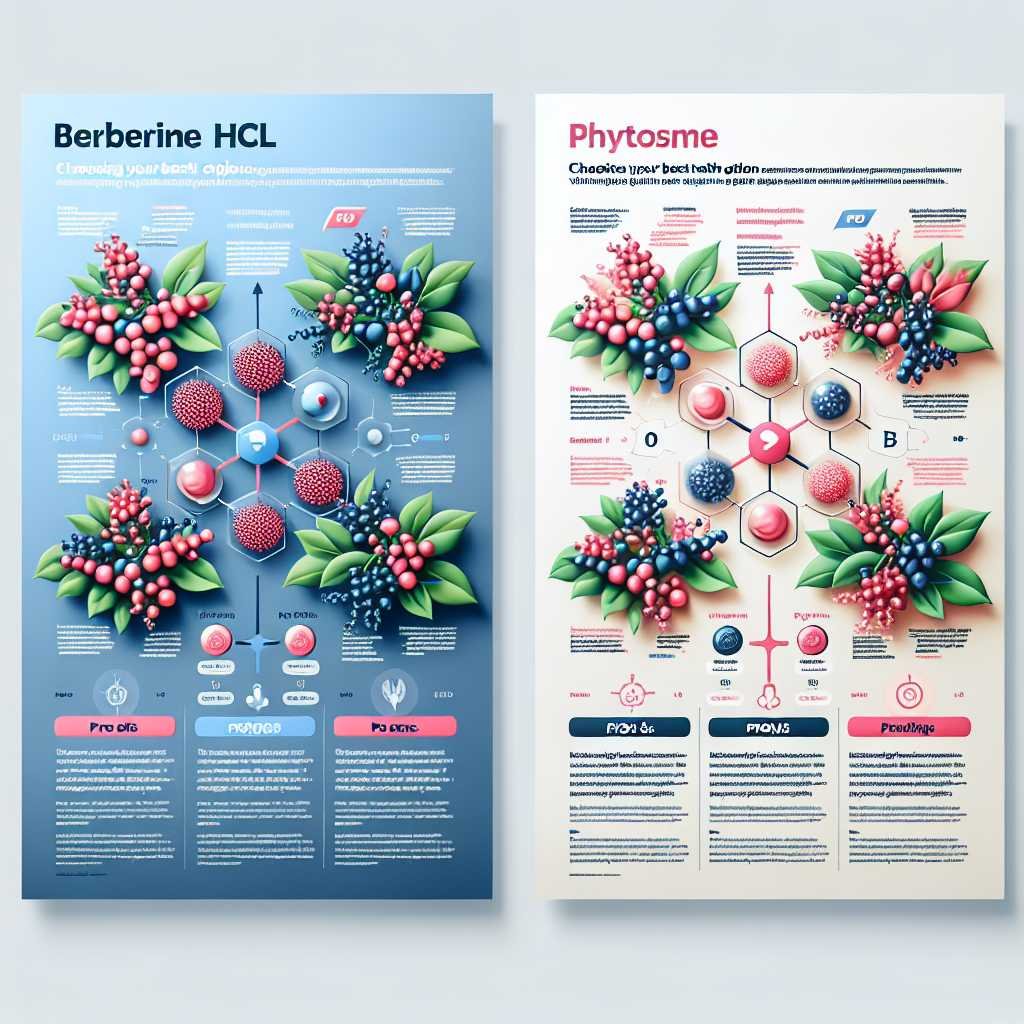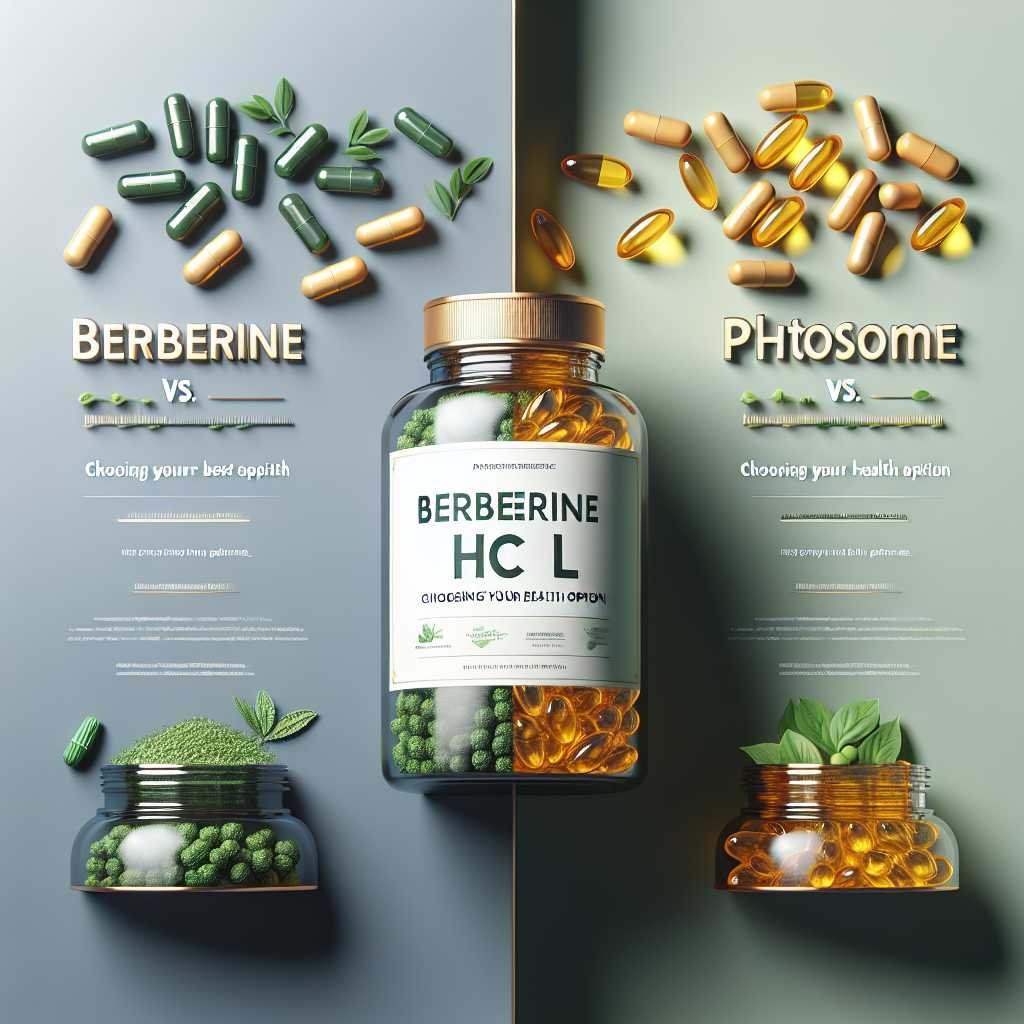Berberine HCL vs. Phytosome: Which One is Right for You?
Introduction
Berberine is a powerful natural compound derived from various plants, including goldenseal, phellodendron, and barberry. With a long history in traditional medicine, it is celebrated for its anti-inflammatory, antioxidant, and antimicrobial properties. This article explores the health benefits of berberine, comparing its two popular forms: Berberine HCL and Berberine Phytosome.

Understanding Berberine
Berberine has gained popularity in dietary supplements due to its numerous health benefits, which include:
- Digestive Health: Berberine’s antimicrobial and anti-inflammatory properties support gastrointestinal health, making it beneficial for conditions like irritable bowel syndrome. It aids in maintaining a healthy gut microbiome and assists in bile secretion.
- Blood Sugar Regulation: This compound enhances insulin sensitivity, facilitating better glucose management, particularly for those with diabetes or at risk of developing it.
- Cardiovascular Support: Berberine positively affects lipid metabolism, reducing cholesterol absorption and promoting its excretion, which helps maintain healthy cholesterol levels and blood pressure.
- Weight Management: By increasing energy expenditure and promoting fat breakdown, berberine can aid in weight loss and maintenance.
- Hormonal Balance: Berberine may alleviate symptoms related to hormonal imbalances, such as those seen in polycystic ovary syndrome (PCOS).
Challenges with Natural Berberine
Despite its benefits, natural berberine faces challenges regarding absorption due to its poor solubility in water and bodily fluids. Consequently, when ingested, a significant portion may not be effectively absorbed into the bloodstream, limiting its overall efficacy. Researchers are actively seeking solutions to enhance the solubility and absorption of this remarkable compound.
What is Berberine HCL?
Berberine HCL, or berberine hydrochloride, is the traditional and most widely used form of berberine in supplements. By combining berberine with hydrochloric acid, this formulation improves solubility, making it easier for the body to absorb. With a rich history in traditional medicine, Berberine HCL is the most researched variant, boasting a wide array of documented health benefits.
What is Berberine Phytosome?
Berberine Phytosome is a newer formulation designed to enhance the absorption and bioavailability of berberine. By combining berberine with phospholipids, this innovative approach significantly improves the compound’s effectiveness in the body.

Comparing Berberine HCL and Phytosome
When considering which form of berberine to choose, it’s essential to understand their differences:
Safety and Side Effects
Both Berberine HCL and Berberine Phytosome have established safety profiles. However, individual responses may vary. While generally safe, some users may experience mild gastrointestinal discomfort, such as nausea or diarrhea.
Absorption and Bioavailability
The key difference between the two forms lies in their absorption rates. Berberine Phytosome is specifically formulated to enhance bioavailability, allowing for better nutrient absorption. This can be particularly beneficial for individuals who may not effectively absorb traditional Berberine HCL, potentially allowing for lower doses and minimizing gastrointestinal side effects.
Choosing the Right Supplement
Deciding between Berberine HCL and Berberine Phytosome depends on your health needs and absorption capabilities. Here’s a quick guide:
Berberine HCL:
- Benefits: Well-documented for blood sugar control, weight management, and cardiovascular health.
- Consider if: You prefer a traditional formulation with a proven track record.
- Cost-Effective: Widely available and often more affordable.
Berberine Phytosome:
- Benefits: Enhanced absorption, making it suitable for those who struggle with higher doses.
- Consider if: You have absorption issues or seek optimal bioavailability.
- Unique Combination: The addition of phospholipids improves absorption significantly.
Maximizing the Benefits of Berberine
Regardless of the form you choose, consider these tips to enhance the effectiveness of your berberine supplement:
- Select a Reputable Brand: Quality is crucial. Opt for well-known brands that provide clear labeling and third-party testing for purity and dosage accuracy.
- Take with Food: Consuming berberine with meals can help reduce gastrointestinal discomfort and enhance its effects on blood sugar and lipid levels.
- Divide Your Dose: Due to its short half-life, splitting your daily dose into 2-3 smaller doses can yield better results.
Conclusion
Both Berberine HCL and Phytosome offer distinct advantages. Understanding their differences can guide you in selecting the right supplement for your health journey. Always consult with a healthcare professional for personalized advice to make the most informed decision regarding your health.
DISCLAIMER: This Wellness Hub does not intend to provide diagnosis…

